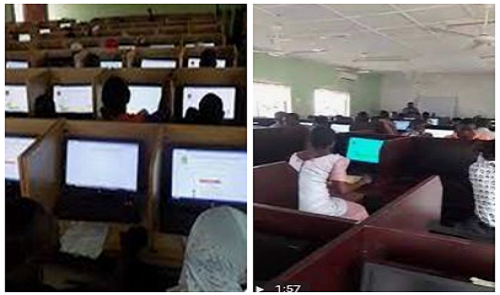
Development and Utilization Webquest as an Instructional Strategy in Teaching Thermodynamics in Colleges of Education in Kwara State
Abstract
Keywords
Full Text:
PDFReferences
Abbit, J. & Ophus, J. (2008). What We Know About The Impacts Of Webquest: A Review of research. AACE Journal, 16 (4), 441 – 456.
Ad, S.A. (2008). Effect of Concept-Mapping Under Three Learning Modes on SS Students Performance in Chemistry in Ilorin, Nigeria. (Doctoral dissertation). Department of Science Education, University of Ilorin, Nigeria.
Adesoji, F.A., & Fisuyi, M. O., (2001). Analysis of Problem-Solving Difficulties Of Students In Volumetric Analysis According to Gender. Ibadan Journal of Education Studies 1(1).
Agogo, P. O, &Omagbu, M.O., (2014). Identification of Students’ Perceived Difficult Concepts In Senior Secondary School Chemistry in Oju Local Government Area of Benue State,Nigeria. Global Research Journal, 2(4), 044-049.
Aoki, J.M. (2004). The Impact Of A Webquest On Pre-Service Elementary School Teacher S In An Undergraduate Life Science Course: A snapshot. Paper presented at the World Conference on E-Learning in Corporate, Government, Healthcare, and higher education (ELERAN), Washington, DC, USA.
Brooks, S, &Byles,B.(2000).Using a Webquest In Your Classroom. Retrieved from http://www.internet4classrooms.com/using_quest.htm
Chatel, R .G., & Nodell, J. (2002). WebQuests: Teachers and Students As Global Explorers. Paper Presented at the Annual Meeting of the Connecticut Reading Association. (ERIC Document Reproduction service No. ED471843).
Crocco, M .S. & Cramer, J. (2005 ). Women, webquest And Controversial Issues In The Social Studies. Social education, Vol. 69,143-148.
Dodge, B. (2004). WebQuest: Concept to Classroom. Retrieved from http://edweb.sdsu.edu/webQuest/tv/
Dodge, B., (1995). Some thoughts about webQuest. Retrieved from http://webQuest.sdsu.edu/about_webQuests.html.
Dodge, B., (2000b). Thinking visually with webQuest. Retrieved, from http://edweb.sdsu.edu/webQuest/tv/
Dodge, B., (2001). FOCUS: Five Rules For Writing A Great Webquest. Learning and leading with technology, 28(8), 6-9.
Halat, E. (2007). Views of Pre-Service Elementary Teachers On The Use Of Webquest In Mathematics Teaching. Elementary Education Online House, 81(3), 109 – 111.
Halat, E., & Perker, M. (2011) The Impact of Mathematical Representations Developed Through Webquest And Spreadsheet Activities on The Motivation of Pre-Service Elementary School
Hassanien, A. (2006). An Evaluation of the webQuest as a Computer-Based Learning Tool. Research in post-compulsory Education, 11 (2),235-250.
HopIkepeze, C.H. & Boyd, F.B. (2007). Web-Based Inquiry Learning: Facilitating thoughtful literacy with WebQuest. The Reading Teacher,60(7),644 – 654.
Lim, S.L., & Hernandez. (2007). The WebQuests: An Illustration Of Instructional Technology Implementation in MFT training. Contemporary Family Therapy, 29(3), 163-175.
Ogunleye, A.O. (1999). Science Education In Nigeria: Historical Development, Curriculum Reforms And Research. Lagos Nigeria: Sunshine International Publications (Nig) Ltd.
Okebukola, P.A.O. (2005). Quality Assurance In Teacher Education: The role of Faculties of Education in Nigeria Universities. A paper presented at the meeting of Committee of Deans of Nigerian Universities. University of Ilorin, Nigeria.
Okeh, O.D., & Opone,M.C., (2007). Information and Communication Technology (ICT): A veritable tool for National Education Growth, Journal of Academics, 2(3), 234-246.
Oladosu, A.G.A.S. (2001). Concepts in Education Related To Teaching: Ini.O. Abimbola (Ed). Fundamental Principles And Practice Of Instruction. Ilorin: Belodan (Nig) Enterprises and Tunde Babs Printers.
Olanrewaju, B.Y. (2009). Ratings of the Difficulty Level of Chemistry Topics by Senior Secondary School Teachers and Students’ in Ilorin, Nigeria. Unpublished Masters project, Department of Science Education, University of Ilorin, Kwara State.
Olorukooba. S. B. (2007). Science Technology and Mathematics (STM) education is for all students: Promoting effective teaching of STM subjects in our schools through teacher preparation. Proceedings of the 50th Anniversary Conference of Science Teachers Association of Nigeria. Pp 3-6.
Olorundare, A.S. (2005). Teacher training: Chemistry modules. Reenergizing Secondary school education in Kwara State. Inform-Ed Consultants.
Olorundare, A. S. (2014). Theory into practice: Beyond surface curriculum in science education.147th Inaugural Lecture Series, University of Ilorin, Nigeria.
Oviawe, J. I., & Oshio. L. E. (2011). Impact of information and communication Technology and learning ability of education students in Universities in Edo State. International Review of Social Sciences and Humanity, 2(1), 126-133.
Oye, N, D., Salleh, M., & Iahad, N. A. (2010). Holistic E-learning in Nigerian Higher Education Institutions. Journal of Computing, 2(11), 20-26.
Selami, A. (2016). WebQuest as language learning tools. Journal of Computer Assisted language
Sesen, B. A., & Tarhan, L. (2010). Promoting active learning in High school chemistry: Learning achievement and attitude. ProcediaSocial and Behavioral Sciences , 2625-2630.
Siko, K. L. (2008). What Students think about using WebQuests in the English Classroom. Proceedings of Society for Information Technology & Teacher Education International Conference 2000 (3330-3339). Chesapeake, VA.
Stockley, D. (2014). E- journey on E- learning. Available online @http://derekstockley.com.au/elearning-definition.html.
Umar, I. N. and Maswan, S. (2010). A Guided Inquiry Learning Approach in a Web Environment: Theory and Application.
Unoroh, E. M. (2004). Levels of Difficulty Of Chemistry Topics As Perceived By Senior Secondary School Teachers And Students in Ekiti State, Nigeria. Unpublished Masters Project, Department of Science Education, University of Ilorin, Ilorin, Nigeria.
Vanguri, P. R., Sunal, C. S., Willson. & Wright, V. H., (2004). WebQuests in social studies education. Journal of Interactive Online Learning 3(2)
Vidoni, K., & Maddux, C. (2002). WebQuests: Can They Be Used to improve Critical Thinking Skills in Students? The Haworth Press, 19(1&2), 101-117.
Wagman, J. C. (2005). The Effects Of An Inquiry-Internet Research Project On Motivation, Self- Efficacy, And Academic Autonomy In Heterogeneously Grouped High School Latin I Students. Dissertation Abstracts International, 60(1). (UMI No.3162731)
Wang, F., & Hannafin, M. J. (2008). Integrating WebQuest in Preservice teacher education. Educational Media International, 45(1), 59 – 73.
Wang, M. J. (2010). Online Collaboration and Offline Interaction between Students Using Asynchronous Tools in Blended Learning. Australian Journal of Educational Technology,26(6), 830-846.
Yoder, M. B. (1999). The Student webQuest. Learning & Leading with Technology, 26(7),6-9.
Young, D. L., & Wilson, B. G. (2002). WebQuest for Reflection And Conceptual Change: Variations On A Popular Model For Guided Inquiry. Paper Presented at the ED-Media 2002 World Conference on Educational Multimedia, Hypermedia & Telecommunication Denver, Colorado Retrieved from ERIC Database.
DOI: http://dx.doi.org/10.31258/jes.7.4.p.675-687
Refbacks
- There are currently no refbacks.
Copyright (c) 2023 Olanrewaju Yetunde Beatrice

This work is licensed under a Creative Commons Attribution 4.0 International License.
Publisher: FKIP Universitas Riau












